- Home
- Iain M. Banks
Feersum Endjinn Page 5
Feersum Endjinn Read online
Page 5
Sessine got out of bed, went to the tall windows and stepped out onto the balcony. The air felt fresh and chilly; a strong wind blew. He shivered, raised his right arm to his face, watched goose-bumps rise under the hairs there, then imagined that the wind dropped. It did.
He imagined that it blew again, but that he felt no cold; in a moment the wind was sharp and clean in his nostrils and cool on his naked skin, but it did not make him shiver.
He went to the parapet. The balcony was situated in one of the higher reaches of the humanly-scaled fortress, with a view to the west. The shadow of the castle lay across the western inner bailey, the umbrous image of the fast-tower just touching the foot of the curtain-walls. As Sessine had ordered, there was nobody to be seen, and not even any wildlife visible. The sky, distant hills and the castle itself looked perfectly convincing.
He imagined himself on the fast-tower
/and was there, suddenly standing on a gaily painted wooden platform at the summit of the castle’s tallest tower, with only a flagpole and a snapping flag - his clan’s - above him. The view was better from here; he could see the ocean, far to the west. Just beyond the handrail the slates sloped away to the circular battlements.
He gripped the wooden rail of the platform, squeezing it until his fingers ached, then squatted and inspected the underside of the rail’s inverted U near where it met a stanchion. The red paint under the flat surface was convincingly bumpy, with little bubbles of smooth, solidified paint near the angle the rail described with the post. He put his thumbnail against one of the bubbles and pressed hard. When he took his thumb away again there was a little groove impressed on the hemisphere of paint.
He ducked quickly under the rail and launched himself into the air. He bounced once off the steeply raked tiles, winding himself and hurting his shoulder, cleared the crenellations of the tower’s battlements and hurtled towards the steeply pitched roof far below. The wind-roar screamed in his ears as the slates rose to meet him.
‘Oh, this is silly,’ he said, gasping against the storm of air.
He cancelled the injury in his shoulder and decided . . . to fly; the roof below slid to one side and he glided away, sweeping through the air above the castle.
Had he plummeted to his death upon that slated roof, it would have been also to another - almost immediate - rebirth in the same bed he had not long departed; just as in base-reality one had eight lives, so one had eight here. Choosing to end them meant that one would remain unconscious for the duration of the mourning period, and only be woken for a slowed-down real and subjective hour to converse with one’s bereaved relations and friends immediately before disposal. This was not a common option, but remained available for those whose depression or ennui extended beyond their deaths.
Flying was exactly as he remembered it from his childhood dreams; it required some sort of willed effort in the mind, like pedalling a cycle even though one’s legs did not move. If one ceased this dream-virtual effort, one sank slowly to earth. The harder one pedalled, the higher one flew. There was no fatigue and no fear, just wonder and exhilaration.
Sessine flew round the castle for some time, at first naked, then clothing himself with trousers, shirt and frock coat. He landed on the balcony outside the bedroom where he had awoken.
A light breakfast was waiting, on a table by the bed. At this point - in every other rebirth since that first one - he had eaten, then indulged in a full morning’s dalliance with a maid he remembered from his late childhood who had been the first woman he had lusted after, as well as one of the few with whom he had been unable to requite such regard. On this occasion, however, he cancelled the breakfast, his growing hunger, and the maid’s appearance. Nor would he spend the next few subjective months in the castle’s library, re-reading books, listening to music, watching films and recorded plays and operas and watching or taking part in discussions with recreated ancients, recreated historical incidents or virtual fictions.
He imagined an antique phone by the bedside. He lifted the receiver.
‘Hello?’ The voice was pleasant and sexless.
‘Enough,’ he said.
The castle vanished before he could replace the handset.
There was ample time before his funeral.
At that point - like all the dead, whether they were high or low, and Privileged or not - he would face the final proof of the crypt’s ferociously impartial judgment. As the saying had it: the crypt was deep and the human soul was shallow. And the shallower the soul, the less of it survived as any sort of independent entity within the data corpus; somebody whose only opinions were received opinions and whose originality quotient was effectively zero would dissolve almost entirely within the oceanic depths of the crypt’s precedent-saturated data streams and leave only a thin froth of memories and a brief description of the exact shape of their hollowness behind, the redundancy of their beings annihilated by the crypt’s abhorrence of over-duplication.
Should that personality ever be called back into existence in the base-level world, it could be recreated exactly from the crypt’s already existing database of sentience types.
It was believed that the certainty of such a verdict provided the incentive for people to improve themselves in a society which gave every appearance of being able to function quite adequately with almost no human input whatsoever.
Sessine, if not as one of the Privileged then as a man who had over the course of several lifetimes assiduously cultivated his own cultivation, was in practice if not in theory guaranteed a continued existence within the corpus as an individual.
Even had he been due solely for the compulsory incorporation that was the fate of lesser mortals when the moment came, there would still have been time for what he had in mind. The three days in physical reality before his funeral equated to over eighty years in the quickened medium of crypt-time; time enough for another life to be lived after death, and easily sufficient to encompass the investigation a dead man might wish to mount into the reason for his murder.
‘The data-set from the time of your death was recorded as a matter of course by your bioware and transmitted to the command car’s event-recorder as well as its own computer; the latter was destroyed along with the car when your murderer turned the car’s gun on the convoy and drew retaliatory fire. The event-recorder survived; it also squirted its primary function-suite state to the nearest convoy units when it realised the car was under attack and these read-outs square with the data in the recorder itself, so we may comfortably assume your final memories are accurate.’
The construct of the clan Aerospace’s chief crypt-lawyer was configured to respond to its clients’ personalities; for Sessine this meant that it appeared as a tall, highly attractive woman in early middle-age who wore her long black hair tied back, used little make-up, dressed in late-twentieth-century corporate-male clothes and talked with quiet authority; Sessine found it almost amusing how perfectly such an image demanded and received his attention. No bullshit, no unnecessary gestures or expressions, no false buddiness, no flimflam and no attempts either to impress or ingratiate. Even his short attention span and low boredom threshold had been catered for; she spoke fast. And in the pauses, he could imagine her unclothed (though, as she was a separate entity within the crypt, such imagining no more made itself immediately actual than it would have had they both been real people in base-reality).
He supposed that a male construct might have worked almost as well, but he liked smart, quick-witted, self-assured women, and he despised the off-the-peg models of such constructs just because convention demanded they must exhibit some hint of vulnerability, some girlishness that was supposed to make him feel that despite such obvious capability and presence, this woman was some kind of sexual pushover, or not really his equal.
They were sitting in a vault room of the Bank of England, in Edwardian times. Their seats were constructed of gold ingots and cushioned with layers of big white five-pound notes; their table was a trolley normally used
to transport bullion. Primitive electric lights flickered on the metal walls and reflected off further piles and stacks of gold bars. Sessine had salvaged the image from an early twenty-first-century VR fiction.
‘What do we have on the man who murdered me?’
‘He was called John Ilsdrun IV, second-lieutenant. Nothing anomalous in his background or recent behaviour. His implants had been doctored and, if he survives in usable form anywhere, it is not in the general body of the crypt. We’re running deeper checks on all his lives and contacts so far, but they’ll take subjective days to complete.’
‘And the message he received?’
‘A code within the gistics burst: “Veritas odium parit.”’
“‘Truth begets hatred.” How cryptic.’
The construct permitted itself a smile.
Barely five minutes had passed in base-reality since his death, and he had spent the great majority of that time unconscious, the data-set that was his stored personality being updated with the rigorously cross-checked information from the time and place of his murder before being activated: the wreck of the command car he and the rest of the crew had been killed in was still burning on the fractured floor of the Southern Volcano Room, the convoy had yet to regroup properly after the young lieutenant’s treacherous attack on it, his co-directors at Aerospace had been summoned to an emergency virtual meeting due to take place in a subjective half-hour and a base-reality physical meeting in the Atlantean Tower scheduled in two hours real - two years and three months subjective - time, while his widow had been contacted but had yet to reply.
‘Backtrack on the coded message; how did it find its way into a hardened military narrowcast?’
‘Still investigating. The jurisdictional protocols concerned are complicated.’
Sessine could imagine; the military would not easily be persuaded to open its data corpus to outside investigation.
‘I want to request an audience with Adijine, priority.’
‘Contacting the Palace, royal apartments . . . monarch’s office ... on hold . . . His Majesty’s private secretary suite . . . your call-sign going through . . . private secretary construct on line real time now. Replace?’ ‘Replace.’
The woman disappeared, turning in a blink into a small wizened man in a black dress coat and holding a long staff. He looked briefly around the vault, stood and bowed slightly to Sessine, then sat again.
‘Count Sessine,’ he said. ‘The King has already asked me to inform you of the profound shock he experienced at hearing of your murder, and to convey his deepest sympathy to you as well as to those you leave behind. He has also asked me to assure you that everything possible will be done to root out those responsible for this foul crime.’
‘Thank you. I would like to request an audience with His Majesty, as soon as possible.’
‘His Majesty can spare a short while between other appointments in twenty minutes real - approximately four months subjective - time.’
‘I must ask for an emergency meeting before then.’
‘I understand your distress and shock, Count Sessine. However, His Majesty is in an important meeting with representatives of the Chapel usurper forces, discussing peace; informing him of your death and giving him time to express the above-mentioned shock and sympathy has already, perhaps, used up whatever diplomatic slack we have with the Engineer delegation; we cannot possibly incur any further interruption without risking an apparent sleight and the breakdown of negotiations.’
Sessine thought about this. The secretary sat smiling patiently at him. Measuring his words, Sessine spoke again: ‘My concern is that the message which appeared to instigate my murder was embedded within a military signal sent from Army HQ, and that this therefore implies either a serious signal-security breach or a traitor in at least the middle-level military.’ He paused to let the secretary speak, then went on. ‘Has the King authorised a full military investigation?’
‘An investigation has been authorised.’
‘At what level?’
‘A level commensurate with your standing, Count; the highest level.’
‘With full military access immediately?’
‘That is not possible; the Army has operational reasons for not being able to reveal such matters precipitously; there are controls, checks and balances which must be negotiated over a minimum real-time scale if one is not to trip a series of automatic security-violation safeguards. The relevant authorisations are of course being sought, but—’
‘Thank you, private secretary. Would you put me on to military High Command, level five, and replace?’
The construct had time to look distinctly annoyed before it was replaced with a young soldier in full dress uniform.
‘Count Sessine.’
‘Is this level five?’ Sessine frowned. ‘I thought—’
The young soldier stood, quickly drew his ceremonial sword and in the same movement brought it scything above the trolley-table and through Sessine’s neck, parting his head from his shoulders.
What? he thought, then everything faded.
He awoke in the tower-bedroom of the ambiently scaled version of Serehfa, alone, on what gave every appearance of being a fine spring morning.
He lay in the bed and looked around. Silk sheets, brocade canopy, oil paintings on the wall, rugs on the floor, wooden panelling, tall windows. He felt washed clean, and distinctly unsettled.
He closed his eyes, said, ‘Speremus igitur,’ and opened his eyes again.
His smile was troubled. ‘Hmm,’ he said quietly.
He got out of bed, dressed in the clothes he had been wearing earlier, and went out onto the balcony.
A dot in the distance, somewhere over the curtain-wall to the west, attracted his attention. A hint of light around it, a thin, hazy trail in the sky behind . . .
He watched the dot expand, then imagined himself on the fast-tower.
/He stood on the gaily painted wooden platform again; the flag snapped in the air above him. He watched the missile tear across the roof-tops below and disappear into the tower where he had been standing a few seconds earlier. The tower erupted; yellow-white flame burst outwards across the balcony, sundering the stones all around that floor and throwing back the tower’s roof, releasing a cloud of slates like some flock of disturbed birds.
Straight through the balcony windows. Sessine felt both impressed and depressed.
He did not see or hear what hit him from behind, just glimpsed a searing light and felt the concussive blast.
He awoke in bed, alone, on what gave every appearance of being a fine spring morning.
He lay there for a second, then imagined himself to the summit of the fast-tower.
/He saw the first missile, crossing the curtain-wall to the west. He turned and saw the other, approaching from the east, level with him and approaching fast. He remembered the feeling he had had when he’d heard the shots inside the scree-car and ducked back in to see what was happening. He imagined the view from the middle of the inner bailey,
/then from a tower on the curtain-wall to the south,
/then from the north,
/then from the eastern gate complex,
/then from some low hills outside the castle altogether.
The whole edifice detonated, disappearing in a scattering series of explosions, flickering light, throwing stones and timbers high into the air, black amongst fire.
‘Sessine?’
He turned, and the image of his first wife was there, standing on the path behind him, as lovely as on the first day they had met. She never called me—
She was upon him with the strangle-wire before he could move; gripping him, trapping him with a strength no human had ever possessed.
He awoke in the bed, alone. What is this? What is going on? Who is—?
Light at the window, something—
Fool!
Then light everywhere.
He awoke in the bed.
‘Alandre,’ the young maid brea
thed, alongside him, reaching.
/He was on the deck of the clan yacht, at anchor one evening off Istanbul; the Bosporus glittered darkly beneath, the twin bridges arced above. His heart thudded. He looked quickly around. Nobody. He looked up. Something falling from the rail-bridge . . . he started to imagine - then light again, atomically bright, lighting up all the city . . .
He awoke.
‘Ala—’
/He was in bed, in his apartments in the clan Aerospace’s headquarters in the Atlantean Tower.
The doctor looked down at him, his face somehow familiar, his expression regretful. The young doctor fired the gun straight between Sessine’s eyes.
He awoke.
‘Al—’
/He was in the nursery of the clan’s Seattle stronghold. The nurse was above him; the knife came down on his mewls.
And something inside him screamed, Seven!
He awoke.
He was in a hotel room; it was small and tawdry-looking. The curtains drawn, the ceiling light on. He was sitting. His heart was hammering, his body covered with cold sweat. He cancelled the fake physical symptoms of his panic then started to imagine being somewhere else . . . but he was out of places to run, and as he did not know where he was, he suspected that here was as good a place as any to stay a while.
What had happened? What had been going on?
He stood up and went to the window, carefully lifting one corner of the curtains while staying behind the wall, half expecting the arrival of a hail of bullets or another missile the instant he betrayed his position.
He looked out onto a darkened town; a port within a huge, dim space all speckled with small lights. Dark waters lay in the distance beyond wharves and cranes. Spaced regularly in the shadows across the inky glints of waves he could just make out huge pillars, growing out of that broad, buried sea like impossibly perfect steep-cliffed islands and sprouting, spreading at their summits to meet a jet-black vaulted sky more remembered than seen.

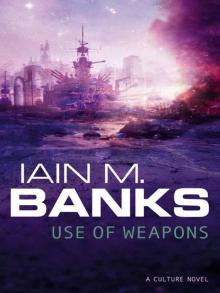 Use of Weapons
Use of Weapons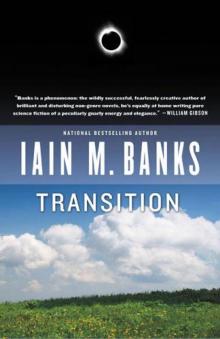 Transition
Transition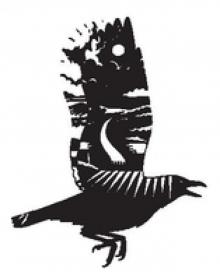 The Crow Road
The Crow Road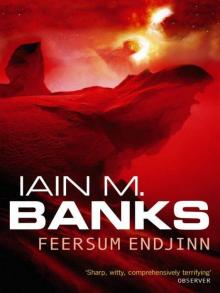 Feersum Endjinn
Feersum Endjinn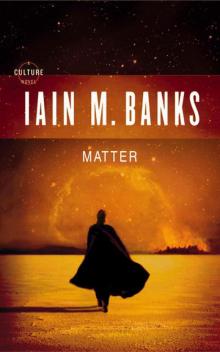 Matter
Matter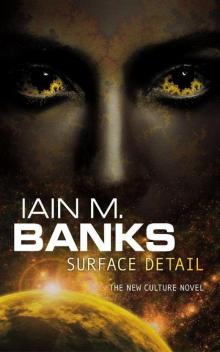 Surface Detail
Surface Detail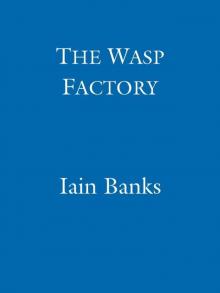 The Wasp Factory
The Wasp Factory Consider Phlebas
Consider Phlebas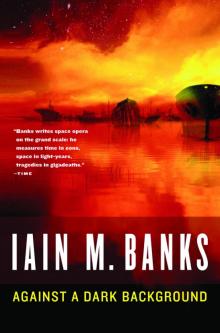 Against a Dark Background
Against a Dark Background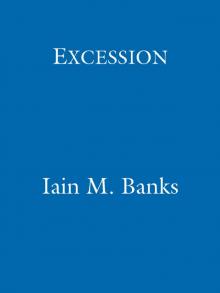 Excession
Excession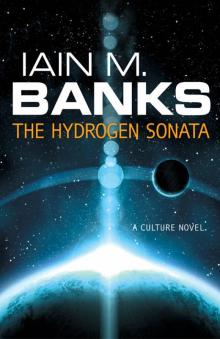 The Hydrogen Sonata
The Hydrogen Sonata The Algebraist
The Algebraist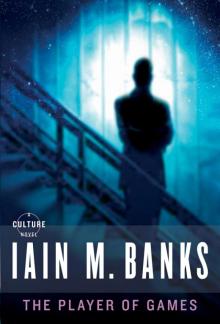 The Player of Games
The Player of Games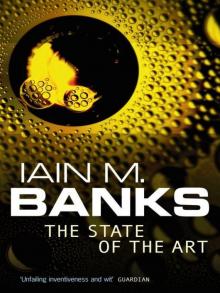 The State of the Art
The State of the Art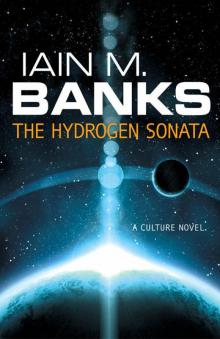 The Hydrogen Sonata c-10
The Hydrogen Sonata c-10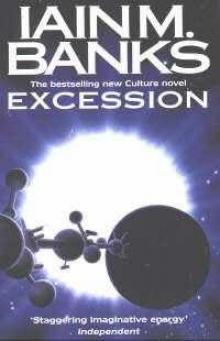 Excession c-5
Excession c-5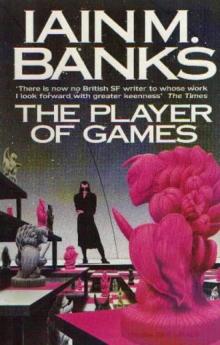 The Player of Games c-2
The Player of Games c-2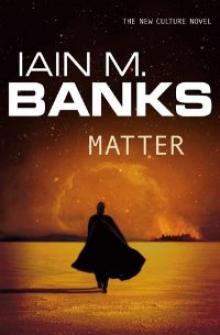 Matter c-8
Matter c-8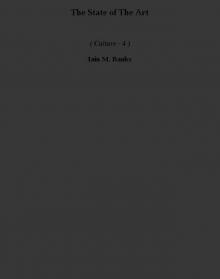 The State of The Art c-4
The State of The Art c-4 Look to Windward c-7
Look to Windward c-7 Consider Phlebas c-1
Consider Phlebas c-1